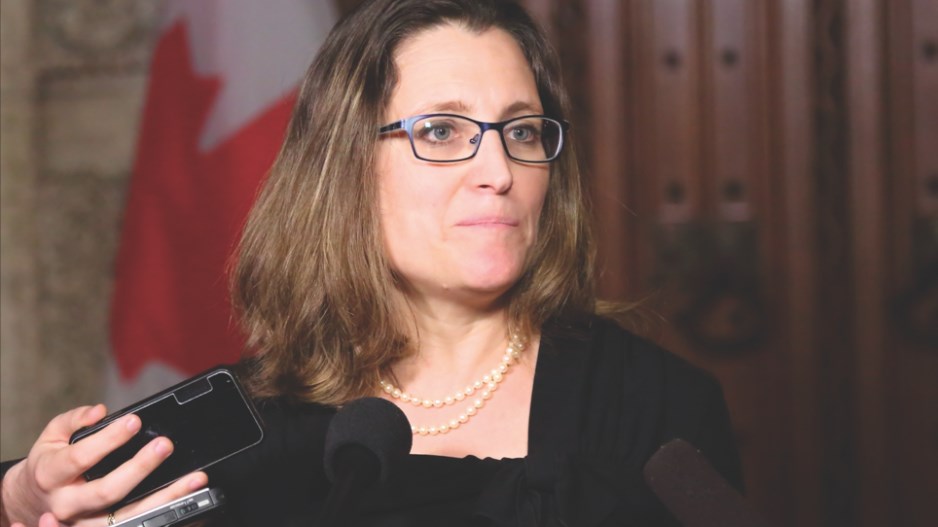The federal Liberals are making childcare a top priority in the first budget tabled in two years.
Finance Minister Chrystia Freeland presented the budget on Monday, revealing plans to spend $30 billion on childcare over five years.
She said that within five years, parents should have access to early learning and childcare for an average of $10 a day.
“Early learning and childcare has long been a feminist issue. COVID has shown us that it’s an urgent economic issue, too,” she said in the House of Commons.
Childcare has taken centre stage amid the pandemic with economists at RBC concluding in a fall 2020 report that family responsibilities that women typically shoulder have put that demographic on a “divergent and troubling trajectory.”
Nearly 68,000 men joined the labour force while 20,600 women departed between February and October of last year, according to RBC’s report.
“I think they [federal Liberals] view the childcare spend as an opportunity to help people get back to work and help to address inequality in terms of the way the pandemic may be impacting women in particular,” Aaron Gillespie, partner, enterprise tax at KPMG Canada told BIV.
“Childcare being the jurisdiction of the provinces, they need to get the support of the provinces and work together on it.”
The Liberals have a minority government and will require the support of opposition to pass the budget.
The inclusion of the $10 a day childcare program — a cornerstone of the NDP’s campaign in the 2019 election — appears poised to get the backing of the NDP.
The government plans to extend relief measures such as the Canada Emergency Wage Subsidy (CEWS) and Canada Emergency Rent Subsidy (CERS) to September after the programs were originally set to expire in June.
Freeland said the costs would come in at $12.1 billion.
“It will be welcomed relief to the private enterprise sector. I think from the government's perspective, the concern is that if they roll back some of the spending too quickly that it could be detrimental on the economy and the economic recovery is anticipated to take longer,” Gillespie said.
The budget also solidifies the government’s previously announced plans to begin taxing tech giants for digital services generating revenue within Canada as well as deploy a sales tax for online platforms and e-commerce warehouses.
Freeland said she is optimistic a deal can be reached with those companies by this summer.
“Canadian firms are already paying specific taxes and what we haven't seen is that tax fairness to large-platform companies and other providers. And so we actually welcome this news,” said Benjamin Bergen, executive director of the Canadian Council of Innovators.
And while U.S. President Joe Biden is seeking to raise the corporate tax rate south of the border to finance his US$2-trillion infrastructure plan, Monday’s budget reveals Canada will keep its corporate tax rate static.
Gillespie said he does not anticipate there being much of an appetite to raise taxes in Canada for now while the country tries to stay competitive with the U.S.
Biden’s own infrastructure plan calls for considerable investments in green technologies and it appears the Liberals are taking a page out of the new American president’s own book.
Budget 2021 proposes to offer $5 billion over seven years to the Net Zero Accelerator, which would facilitate projects that help reduce domestic greenhouse gas emissions.
The government is also aiming to reduce corporate and small business income tax rates as much as 50% for businesses that manufacture zero-emission technologies, going into effect in 2022 before being eliminated out by 2032. The Department of Finance would regularly review the technologies eligible for this program.
The federal budget also singled out B.C., noting Ottawa would work with the province to provide up to $35 million to establish the Centre for Innovation and Clean Energy in a bid to accelerate commercialization of clean technologies.
Personal tax rates are not increasing but the government is putting forward a new luxury tax targeting new cars and private aircraft worth more than $100,000 and boats worth more than $250,000 going into 2022.
The finance minister also reaffirmed the government was earmarking up to $100 billion in stimulus spending over the next three years.
RBC senior economist Josh Nye said last week that such stimulus would be “excessive” in light of how much the economy has been expanding after last year’s initial pandemic-induced shutdown.
“The current fiscal year will coincide with dramatic improvement in Canada’s economy. Growth was surprisingly resilient through the second wave of COVID-19, and while a third wave is clouding the near-term outlook, we expect accelerating vaccine rollout will help the economy build momentum over the summer,” he said in a note.
“This is all the more important as excessive stimulus spending could generate inflationary pressure, put upward pressure on interest rates and crowd out private investment, and threaten debt sustainability.”
Other highlights:
· $3 billion for long-term care facilities
· $2.2 billion for bio-manufacturing and life sciences
· $8.9 billion for Canada workers benefit over six years for low-wage workers
· $15 federal minimum wage
· $3.8 billion ($1.3 billion of which is reallocated spending) for the building and repair of 35,000 housing units
@reporton



